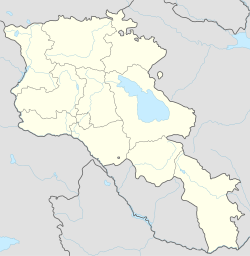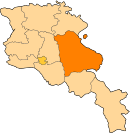Drakhtik
Appearance
Drakhtik
Դրախտիկ | |
|---|---|
 A view of Drakhtik | |
| Coordinates: 40°33′54″N 45°14′16″E / 40.56500°N 45.23778°E | |
| Country | Armenia |
| Province | Gegharkunik |
| Municipality | Shoghakat |
| Elevation | 1,981 m (6,499 ft) |
| Population | |
• Total | 909 |
| Time zone | UTC+4 (AMT) |
| Postal code | 1311 |
| Drakhtik at GEOnet Names Server | |
Drakhtik (Armenian: Դրախտիկ) is a village in the Shoghakat Municipality of the Gegharkunik Province of Armenia.[2]
Etymology
[edit]The village was previously known as Tokhluja[3][4] (Azerbaijani: Toxluca;[5] Russian: Тохлуджа;[6][7] Armenian: Թոխլուջա[8]). The current name of the village, Drakhtik, means "little paradise" in Armenian.[5]
History
[edit]Drakhtik, then known as Tokhluja, was part of the Nor Bayazet uezd of the Erivan Governorate within the Russian Empire.[6] Bournoutian presents the statistics of the village in the early 20th century as follows:[4]
| Ownership | Treasury |
|---|---|
| Inhabited space | 21 desyatinas (0.34 sq km) |
| Vegetable gardens | 3 desyatinas (0.05 sq km) |
| Irrigated plowed fields | 24 desyatinas (0.39 sq km) |
| Unirrigated plowed fields | 1,156 desyatinas (18.94 sq km) |
| Unirrigated fodder fields | 460 desyatinas (7.54 sq km) |
| Yaylaks | 362 desyatinas (5.93 sq km) |
| Total land | 2,026 desyatinas (33.20 sq km) |
| Total households | 155 (All Tatar (later known as Azerbaijani)) |
| Total income | 7,291 rubles |
| Total land taxes | 1,624.83 rubles |
| Army tax | 255 rubles |
| Upkeep of officials | 526.36 rubles |
| Total revenue | 2,406.19 rubles |
| Large livestock | 1,490 |
| Small livestock | 1,309 |
Economy
[edit]The population is engaged in animal husbandry, vegetable growing and grain cultivation.[9]
Demographics
[edit]The population of Drakhtik since 1829 is as follows:[9][8] [better source needed]
| Year | Population | Note |
|---|---|---|
| 1829 | 296 | |
| 1831 | 100% Muslim | |
| 1873 | 466 | 100% Tatar (later known as Azerbaijani) |
| 1886 | 681 | |
| 1897 | 935 | 100% Muslim. 495 men and 440 women.[7] |
| 1904 | 1,170 | |
| 1914 | 1,373 | Mainly Tatar. Also recorded as 1,285 |
| 1916 | 1,330 | |
| 1919 | 1,199 | Mainly Turkish |
| 1922 | 1,176 | 100% Turkish-Tatar |
| 1926 | 1,413 | 1,403 Turks, 5 Armenians, 5 Russians. Also recorded as 1,417 |
| 1931 | 1,723 | 100% Turkish |
| 1939 | 1,840 | |
| 1959 | 1,528 | |
| 1970 | 2,469 | |
| 1979 | 2,664 | |
| 2001 | 1,044 | |
| 2004 | 871 | |
| 2011[1] | 909 |
Gallery
[edit]-
Panorama of Lake Sevan from near Drakhtik.
References
[edit]- ^ Jump up to: a b Statistical Committee of Armenia. "The results of the 2011 Population Census of Armenia" (PDF).
- ^ Kiesling, Brady; Kojian, Raffi (2005). Rediscovering Armenia: Guide (2nd ed.). Yerevan: Matit Graphic Design Studio. p. 83. ISBN 99941-0-121-8.
- ^ Kiesling, Brady (June 2000). Rediscovering Armenia: An Archaeological/Touristic Gazetteer and Map Set for the Historical Monuments of Armenia (PDF). Archived (PDF) from the original on 6 November 2021.
- ^ Jump up to: a b Bournoutian, George A. (2018). Armenia and Imperial Decline: The Yerevan Province, 1900–1914. Milton Park, Abingdon, Oxon: Routledge. ISBN 978-1-351-06260-2. OCLC 1037283914.
- ^ Jump up to: a b Nişanyan, Sevan. "Draxtik". Index Anatolicus (in Turkish). Retrieved 31 January 2024.
- ^ Jump up to: a b Кавказский календарь на 1910 год [Caucasian calendar for 1910] (in Russian) (65th ed.). Tiflis: Tipografiya kantselyarii Ye.I.V. na Kavkaze, kazenny dom. 1910. Archived from the original on 15 March 2022.
- ^ Jump up to: a b Troinitsky, N. A. (1905). Населенные места Российской империи в 500 и более жителей с указанием всего наличного в них населения и числа жителей преобладающих вероисповеданий, по данным первой всеобщей переписи населения 1897 г. [Populated areas of the Russian Empire with 500 or more inhabitants, indicating the total population in them and the number of inhabitants of the predominant religions, according to the first general population census of 1897.] (in Russian). Saint Petersburg: Tipografiya Obshchestvennaya polza. p. 55. Archived from the original on 10 August 2022.
- ^ Jump up to: a b Korkotyan, Zaven (1932). Խորհրդային Հայաստանի բնակչությունը վերջին հարյուրամյակում (1831-1931) [The population of Soviet Armenia in the last century (1831–1931)] (PDF) (in Armenian). Yerevan: Pethrat. Archived from the original (PDF) on 2 February 2022.
- ^ Jump up to: a b Հայաստանի Հանրապետության բնակավայրերի բառարան [Republic of Armenia settlements dictionary] (PDF) (in Armenian). Yerevan: Cadastre Committee of the Republic of Armenia. 2008. Archived from the original (PDF) on 11 March 2018.
External links
[edit]- Report of the results of the 2001 Armenian Census, Statistical Committee of Armenia
- Kiesling, Brady (June 2000). Rediscovering Armenia: An Archaeological/Touristic Gazetteer and Map Set for the Historical Monuments of Armenia (PDF). Archived (PDF) from the original on 6 November 2021.





